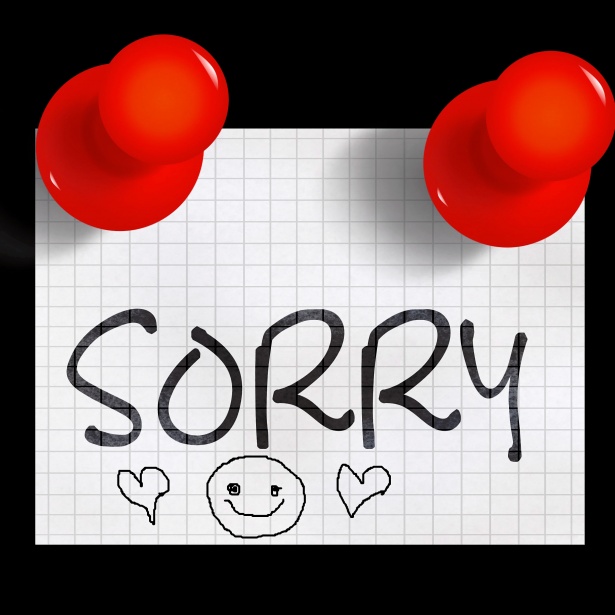It’s one of the biggest cliches out there: everyone makes mistakes. Making mistakes, honestly assessing the outcome, accepting the consequences, and learning from your faux pas is one of the main ways we can grow as humans and improve ourselves.
Plenty of psychologists, life coaches, motivational speakers, and titans of industry have waxed poetic about the value inherent in “failing up.” Some go so far as to actively seek out failure in order to reap the benefits of its lessons. But when you make a big mistake — a potentially life-altering mistake — it can sometimes feel as though the punishment is excessive. After all, what’s the point of learning from your failure if you don’t get a second chance to apply those lessons and do better?
You can’t control other people’s feelings, actions, or decisions, of course. But you can learn how to apologize sincerely and state your case in favor of a second chance. Let’s take a closer look at the elements of contrition.
1. A Healthy Dose of Humility
When you have screwed up, it’s very tempting to become defensive, make excuses, and look for scapegoats. No one likes to admit that they used poor judgment or leaped before they looked.
It’s not often that this approach gets you anywhere, however. If there are mitigating factors, the person you’ve wronged might take those into account — but not if your attitude is aggressive and defensive. Instead, eat some humble pie and be willing to admit your shortcomings.
2. Make Your “I’m Sorry” Sincere
Have you ever had someone apologize to you by saying “I’m sorry that you feel that way” or “If I have hurt you, I’m sorry”? Both of these lackluster apologies skirt the issue of accountability and in fact, try to shift the blame.
Giving a half-hearted or insincere apology not only won’t earn you forgiveness and respect, it can actually make things much worse. Don’t apologize until and unless you can do so from the heart and with humility.
David Hunter, an attorney who works to get Fort Bend criminal records expunged, knows a thing or two about missteps and second chances. “A meaningful apology is one that shows you’ve truly thought about the situation — not just the role you played in causing a problem, but what the other person experienced as a result,” says Hunter. “A manipulative apology, on the other hand, is pretty transparent and will not help you achieve forgiveness.”
4. Demonstrate Understanding of Your Misdeed
All too often, people begin apologizing straightaway, perhaps hoping to fend off any further blame or anger, or simply as a knee-jerk reaction. It’s important, however, to truly understand how your actions affected the other party, and to use that empathy as the foundation of your apology.
We are quick to employ empathy when trying to correct our children’s behavior. Parents often say things like “How would you feel if Jayden stole your toy?” or “Think about what it would be like if Sarah pulled your hair.” But often we forget to do the same ourselves. When someone is angry with you, it can be incredibly difficult to put down your defenses and try to see the issue from their point of view — but it’s also imperative that you try.
Do this by using active listening techniques and allowing the other party to have their say. If you can step away from your ego long enough for honest, meaningful communication to take place, the relationship will be all the stronger for it and you’ll have set the stage for forgiveness.
5. Asking for a Second Chance
Just because you have done the requisite soul-searching and given a heartfelt apology doesn’t automatically qualify you for a second chance, but it can set the stage. From there, it’s incumbent on you to express that you do not take the second chance lightly and to explain how you will behave if you are given another shot. Of course, you will also need to follow through with that behavior.
Lastly, be prepared to accept the other person’s decision. If they decide not to be lenient or grant you another opportunity to do the right thing, don’t get upset or angry and don’t wheedle or beg. Take your lumps, and resolve to do whatever it takes to prevent yourself from getting into this same pickle down the line.
Second Chances Can Have Remarkable Results
Whether you’ve stolen from an employer, been unfaithful to your significant other, cheated on an exam, gotten a DUI, or left a friend in the lurch, know that you’re not alone. We all commit errors once in a while, sometimes colossal ones.
Getting a second chance after you flubbed up the first time around is often beneficial to both parties. But that opportunity must be earned by issuing a genuine, remorseful apology, and by demonstrating that you understand the consequences of your actions.
Have you ever made a huge mistake? Or have you ever made the decision to forgive someone and were grateful you gave them a second chance? Tell us all about it in the comment section below!

